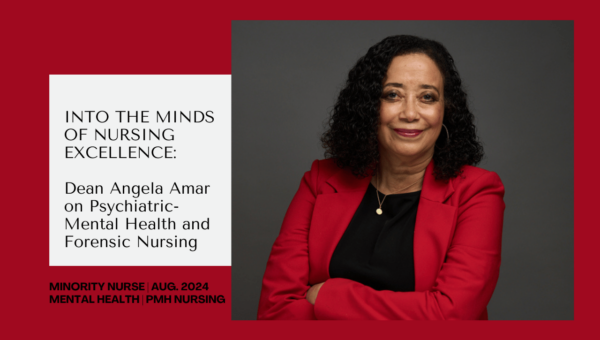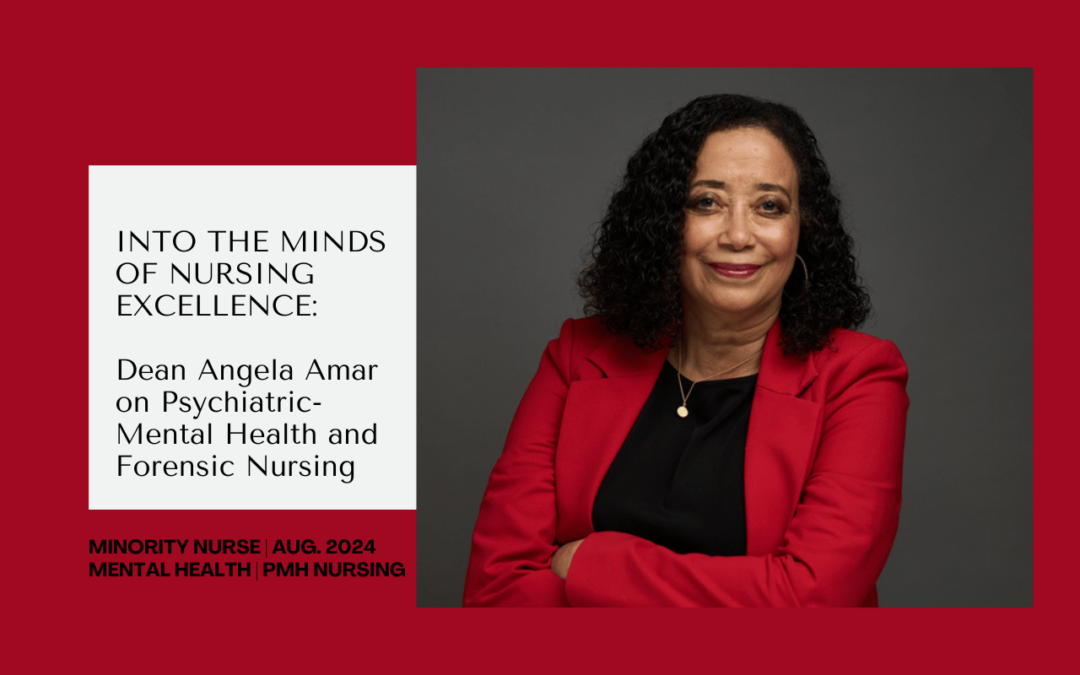In the busy world of healthcare, a group of hidden heroes emerges with specialized care and unwavering dedication: meet the unsung champions of psychiatric-mental health (PMH) nursing. These caregivers play a crucial role in shaping compassionate mental healthcare.
We spoke with Angela Amar, PhD, RN, FAAN, the Dean and Erline Perkins McGriff Professor at the New York University Rory Meyers College of Nursing. Dean Amar is a PMH nurse with expertise in gender-based violence and discusses the roles of PMH and forensic nursing.
Please talk about your career path and how you became a PMH nurse.
I became a nurse because I liked science and helping people. I’ve always been intrigued by human behavior. Even as a child, I remember watching people interact and wondering why they did the things they did. Psychiatric nursing provides a window into understanding human behavior and the tools and skills to help people. This skill has been very useful as a nurse administrator.
Please talk about what a psychiatric-mental health nurse does.
Psychiatric mental health nurses (PMH) provide nursing care for patients with psychiatric illnesses and symptoms. PMH nurses provide comprehensive care to individuals, groups, families, and communities who are affected by mental illness and substance abuse.
How do you become a psychiatric-mental health nurse?
All nurses receive education and clinical experience in assessing, diagnosing, caring for, and treating mental health and substance disorders. Working in a mental health unit or facility will allow a nurse to learn more psychiatric skills. To become a psychiatric/mental health nurse practitioner, one must complete a graduate education program and become licensed and certified.
You have expertise in gender-based violence and forensic nursing. What is forensic nursing?
The International Association of Forensic Nurses (IAFN) defines forensic nursing as “…the practice of nursing globally when health and legal systems interact” (IAFN). Forensic nurses are often described as the link between the health care and criminal justice systems. Establishing this linkage between health care and the criminal justice system is essential to providing the comprehensive care victims and offenders of violent crimes need. Specifically, forensic nurses provide specialized health care and expertise to meet the needs of victims and offenders of violence. Specialized health care may include evaluation, identification, and treatment of injuries, collection of biological and physical evidence, legal documentation of injuries, and, sometimes, participation in legal court proceedings.
Can you talk about the field where this expertise is useful?
Forensic nurses practice in various settings with a diverse group of victims and offenders. Many forensic nurses work as part of interdisciplinary teams that investigate abuse or neglect situations with adults and children, as well as teams involved in prevention efforts. Forensic nurses in critical and emergency care and psychiatric nursing routinely interact with individuals who have experienced violence and its consequences. These nurses provide physical care while attending to the collection of evidence and documentation for legal proceedings.
Forensic nurses may work with individuals in prisons and jails’ medical, psychiatric, and evaluation units. Psychiatric nurses work with victims and offenders. Other areas of forensic nursing practice include death investigation, mass disaster care/investigation, and legal nurse consulting. Examples of potential employers include hospitals, community health care sites, law enforcement, coroner’s offices, and the military; potential roles are nurse coroner and forensic nurse examiner.
What types of conditions do forensic nurses manage?
The earliest and most recognized role in forensic nursing in the United States is that of the sexual assault nurse examiner (SANE). The purpose of SANE programs is to provide victims of sexual assault with health care, forensic assessment, evidence collection, forensic documentation, and court testimony. Other roles include death investigation, child, elder, and intimate partner violence investigation, corrections nursing, and legal nurse consultant.
What are the challenges of forensic nursing?
Forensic nurses are exposed to the savagery of violence and crime and the difficult aftermath survivors experience on a daily basis. Self-care and fortitude are important, as is working in a community and on a team that can provide support. As a newer specialty within nursing, the roles are not always understood, and many nurses have created roles for themselves in systems that did not initially see the need.
What are the most critical skills for forensic nurses?
Unfortunately, too many people in our society experience violence and crime as victims and offenders, as well as affected family members, friends, or significant others. Forensic nurses are ready to help them and demonstrate caring, capability, and compassion. Excellent interpersonal and communication skills are essential, as is knowledge of the dynamics of violence and crime.
What makes being a forensic nurse so unique?
Forensic nursing is an innovative and evolving nursing specialty that addresses healthcare issues with a medico-legal component. In responding to the societal and health care needs created by increasing criminal violence, forensic nursing programs provide nurses with the necessary skills for specialized health care and expertise to meet the needs of victims and offenders of violence. Violence and crime are major issues affecting our society. Nurses provide care to victims and offenders of violence in a variety of settings, often without specialized training.
Are there evidence-based guidelines forensic nurses must follow?
All nurses follow evidence-based practice guidelines. This also pertains to SANEs and the other forensic roles.
You’re a leading scholar in gender-based violence and have influenced the direction of campus policy nationally. Can you talk about these policies and their role in nationwide campuses?
My research examines help-seeking behavior, specifically in college students who have experienced sexual or relationship violence. Many young adults do not report violence and often do not receive follow-up care for the physical and psychological effects. My research examined factors influencing help-seeking behavior at the individual, relational, and community levels. Specifically, we explored how friends can be more effective in promoting help-seeking and how campus policies may inhibit or promote help-seeking.
You just finished your first year as the Dean of New York University Rory Meyers College of Nursing and Erline Perkins McGriff Professor of Nursing. How did the year go, and what are you looking forward to in your second year?
It’s been a great year. NYU Meyers is a vibrant community in a dynamic and global university in one of the world’s greatest cities. The faculty and staff are talented and engaged, and the students are smart and stellar. NYU Meyers has always had an eye on the future and is a trend-setting and change-making institution. I am excited by the possibilities of continuing to lead the nation, expand our global footprint, and continue with innovative research and teaching while promoting a learning organization where everyone thrives and grows.
- Into the Minds of Nursing Excellence: Dean Angela Amar on Psychiatric-Mental Health and Forensic Nursing - August 8, 2024
- Nurse’s Side Gig: SWOOP - July 11, 2024
- Meet a Champion of Nursing Diversity: Temitope (Temi) Oseromi - June 26, 2024



